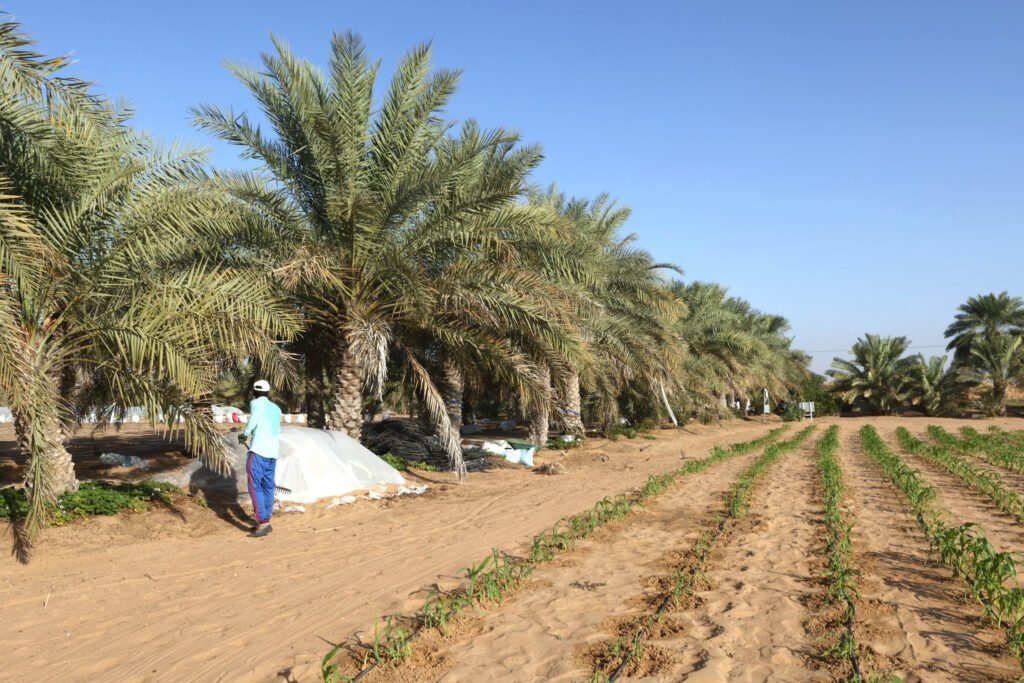Abu Dhabi, known for its vast desert and scorching temperatures, is not the first place that comes to mind when thinking about farming. However, in recent years, the city has transformed its agriculture sector using cutting-edge technology, sustainable methods, and government support. The once-barren land is now home to thriving farms that produce fresh fruits, vegetables, and even fish.
Farming in the Desert: A Tough Challenge
Farming in Abu Dhabi comes with many difficulties. The hot climate, limited water supply, and poor soil make traditional farming nearly impossible. However, with the rise of new agricultural techniques, farmers are now overcoming these challenges.
One of the biggest problems in desert farming is water scarcity. Since Abu Dhabi receives very little rainfall, farmers depend on alternative water sources such as desalinated seawater and treated wastewater. Additionally, modern irrigation methods like hydroponics and aquaponics have helped reduce water usage significantly.

Hydroponics and Aquaponics: The Future of Farming

Hydroponics is a soil-free farming technique where plants grow in nutrient-rich water. This method uses up to 90% less water than traditional farming and allows crops to grow faster. Many farms in Abu Dhabi now use hydroponics to produce fresh vegetables like lettuce, cucumbers, and tomatoes.
Aquaponics takes hydroponics a step further by combining fish farming with plant growth. In this system, fish waste provides natural fertilizer for plants, while the plants help clean the water for the fish. This creates a sustainable cycle, making it an environmentally friendly way to farm in the desert.

These systems also require controlled environments where temperature, humidity, and nutrient levels are monitored carefully. Advanced hydroponic and aquaponic farms use automated systems to adjust these factors in real-time, ensuring maximum efficiency and high-quality produce.
Vertical Farms: Growing Upwards Instead of Outwards
Since land is limited, Abu Dhabi has also invested in vertical farming. This technique allows crops to grow in stacked layers inside controlled environments. Vertical farms use LED lighting, automated watering systems, and climate control to ensure optimal plant growth.
These farms take up less space, reduce the need for pesticides, and produce crops all year round. Some companies in Abu Dhabi have even started growing leafy greens and herbs in indoor vertical farms, supplying fresh produce to local supermarkets and restaurants.
Vertical farms are particularly useful in urban areas where land is scarce. They allow for local food production, reducing the need for transportation and lowering carbon emissions. In addition, these farms can operate 24/7, producing consistent yields regardless of external weather conditions.
The Role of Technology in Farming
Technology plays a huge role in modern farming in Abu Dhabi. Drones, sensors, and artificial intelligence (AI) help monitor crops, detect diseases, and improve efficiency. Smart greenhouses use climate control systems to provide the ideal temperature and humidity for plant growth.
AI-powered systems can analyze data and recommend the best farming practices. For example, sensors in the soil can measure moisture levels and tell farmers exactly when to water their crops, preventing waste and improving productivity. Machine learning algorithms can also predict potential disease outbreaks, allowing farmers to take preventive measures before their crops are affected.
Robotics is another growing trend in Abu Dhabi’s farming industry. Automated machines can handle tasks like planting, watering, and harvesting with precision. This not only increases efficiency but also reduces labor costs and ensures consistent production quality.
Government Support and Investments
The Abu Dhabi government has been actively supporting agricultural development through various initiatives. The Abu Dhabi Agriculture and Food Safety Authority (ADAFSA) provides funding, training, and research to help farmers adopt sustainable practices. The government also offers incentives for businesses that invest in modern farming solutions.
Several large agricultural projects have been launched, such as the Abu Dhabi Food Hub, which aims to increase local food production and reduce dependence on imports. These initiatives not only boost food security but also create jobs and promote innovation in the sector.
In addition to financial support, the government is also working on policies to encourage sustainable farming practices. Regulations are being put in place to ensure water conservation, responsible land use, and eco-friendly farming techniques. This strategic approach is helping Abu Dhabi build a resilient agricultural industry that can withstand climate challenges.
Growing Food Locally: A Step Towards Food Security
With a heavy reliance on imported food, Abu Dhabi has made it a priority to increase local food production. By investing in modern farming techniques, the city aims to reduce its dependence on other countries for food supply. Locally grown produce is fresher, healthier, and reduces the environmental impact of transportation.
Abu Dhabi’s farming success has also encouraged residents to grow their own food at home. Community gardens and small-scale hydroponic systems are becoming popular among city dwellers who want to eat fresh, homegrown vegetables. Some companies even offer ready-to-use hydroponic kits for individuals who want to grow herbs and leafy greens in their apartments.
The introduction of urban farming initiatives is also helping to educate the public about sustainable agriculture. Schools and community centers are hosting workshops on modern farming techniques, inspiring the next generation to take an interest in food production.
The Future of Farming in Abu Dhabi
Farming in Abu Dhabi is no longer just a dream—it is a reality. With the help of technology, innovation, and government support, the city is proving that food can be grown even in the harshest conditions. As the demand for fresh, sustainable produce increases, Abu Dhabi will continue to invest in modern agriculture.
In the coming years, we can expect to see even more advanced farming techniques, including artificial intelligence-driven farms, robotic harvesting, and climate-controlled greenhouses. These advancements will further boost local food production, making Abu Dhabi a leader in desert farming.
Research into salt-tolerant crops and genetically modified plants that can withstand extreme heat is also underway. Scientists are exploring ways to adapt crops to desert environments, which could revolutionize farming not just in Abu Dhabi but in other arid regions around the world.
As the world faces food security challenges, Abu Dhabi’s efforts serve as an inspiration. The city’s commitment to sustainable agriculture proves that with the right resources and determination, farming can thrive anywhere—even in the middle of a desert. With continued investment and innovation, Abu Dhabi is set to become a global hub for modern and sustainable farming practices.
Also read: Bay Avenue Park: A Peaceful Green Escape in the Heart of Dubai














